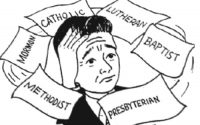COMMAND, EXAMPLE, INFERENCE
In all matters of faith and morals we must be governed by divine authority. It must rest upon “that which is written” in the Word of God (Jer10:23; Prov 14:12; Eccl 12:13; 2 Tim 3:16-17; 2 Pet 1:3,20f). The Scriptures furnish “all things which pertain unto life and godliness.” It is a sin to change, add to or take away from what is written in the Bible (2 Jn 9-11; Rev 22:18-19). We must know and follow the law of Christ (Heb 9:15-17; Gal 5:1-4). How are things authorized in the Bible? 1. By Direct Command. Acts 2:36-38 records a command of an inspired apostle (repent and be baptized). Another is 2 Thes 3:6, a command to keep away from those who do not live according to the apostles’ teaching. Also see Col 3:16, a command to teach the word by singing spiritual songs. 2. By Approved Example. The prophets were examples of patience approved by God (James 5:10). Sodom’s sexual immorality is an example of those who will be punished by eternal fire (Jude 7) . 3. By Necessary Inference, an unstated logical deduction. Jesus said “Go preach.” He did not say how to go. The logical deduction is that we may walk, ride or fly.
(#140)
